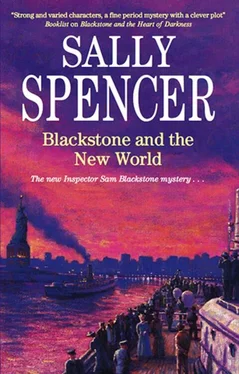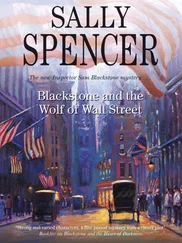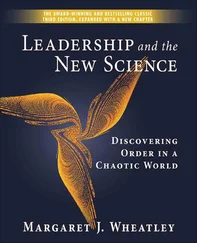Sally Spencer - Blackstone and the New World
Здесь есть возможность читать онлайн «Sally Spencer - Blackstone and the New World» весь текст электронной книги совершенно бесплатно (целиком полную версию без сокращений). В некоторых случаях можно слушать аудио, скачать через торрент в формате fb2 и присутствует краткое содержание. Жанр: Исторический детектив, на английском языке. Описание произведения, (предисловие) а так же отзывы посетителей доступны на портале библиотеки ЛибКат.
- Название:Blackstone and the New World
- Автор:
- Жанр:
- Год:неизвестен
- ISBN:нет данных
- Рейтинг книги:4 / 5. Голосов: 1
-
Избранное:Добавить в избранное
- Отзывы:
-
Ваша оценка:
- 80
- 1
- 2
- 3
- 4
- 5
Blackstone and the New World: краткое содержание, описание и аннотация
Предлагаем к чтению аннотацию, описание, краткое содержание или предисловие (зависит от того, что написал сам автор книги «Blackstone and the New World»). Если вы не нашли необходимую информацию о книге — напишите в комментариях, мы постараемся отыскать её.
Blackstone and the New World — читать онлайн бесплатно полную книгу (весь текст) целиком
Ниже представлен текст книги, разбитый по страницам. Система сохранения места последней прочитанной страницы, позволяет с удобством читать онлайн бесплатно книгу «Blackstone and the New World», без необходимости каждый раз заново искать на чём Вы остановились. Поставьте закладку, и сможете в любой момент перейти на страницу, на которой закончили чтение.
Интервал:
Закладка:
Sally Spencer
Blackstone and the New World
PROLOGUE
New York City, 23rd August 1900
The beer hall’s sole purpose was to make the burly men in lederhosen forget that they had left their home country for ever, and in this it was a great success.
They sat, squeezed tightly together, at the long wooden tables. Some rubbed shoulders with lifelong friends, some with casual acquaintances and some with men they had only just met. None of that mattered, because they were all Bavarians, and when one spoke of the mountains and lakes he had once known, they all pictured it in their minds.
They drank foaming beer from stone steins, and nibbled at large German sausages. They swayed — gently and in unison — to the syrupy music which was being pumped out by the two accordionists on the small stage. Occasionally, one of them would sing, and even if his voice was not particularly strong, the others would beat out the time on the table in a gesture of solidarity — for though they all led separate lives on the outside, in here they were a single entity.
But there was one man — alone at the bar counter — who stood out as different. It was not simply his clothing which distinguished him, though his sober suit certainly looked out of place. Nor was it the fact that he was not German-American. What truly set him apart was the fact that he was clearly not having a good time.
Inspector Patrick O’Brien took a listless sip of his beer and checked his pocket watch for perhaps the fifth or sixth time.
He felt a bubbling in his stomach — like Irish stew boiling over — and accepted, with some reluctance, that he was nervous. It was a new experience for him. He had spent the previous seven years investigating police corruption, and in that time there had been death threats — and even one actual assassination attempt — yet his nerve had held throughout it all. But this was different. This was more important. His fate — and the fate of others — was being held in the balance.
He checked his watch again.
His contact was late.
Very late.
A tuba player had now joined the accordionists on the stage, and the music, while not losing any of its sentimentality, had become more strident.
O’Brien fought the temptation to glance at his watch again, knowing that — at most — a minute had passed since he’d last looked at it.
‘ Noch einer? ’ asked the barman.
‘I beg your pardon?’
‘Would you like another beer?’
O’Brien looked down at his stein, and saw that it was nearly empty.
‘No, I. . no, thank you, I’ve had enough.’
The barman gave him a look which said that a real man would be on his third or fourth drink by now, then turned away dismissively.
It had seemed like a good idea to arrange the rendezvous somewhere he was not known himself, but which was familiar territory to his contact, O’Brien thought. But now — as he saw that at least one of the drinkers was casting curious glances in his direction — he was beginning to think it had been a mistake.
And that was not the only mistake he had made.
It had been a mistake to go and see Senator Plunkitt — a sign of weakness that, even after this matter was resolved, a devious man like Plunkitt might be able to use against him.
His fingers instinctively reached for the chain which held his pocket watch, and it was only with considerable mental effort that he forced them to withdraw again.
Perhaps he should tell the barman that he wanted another beer after all, he thought, for though he was not normally much of a drinker, it might do him good to get really rolling drunk just this once.
‘Fool!’ he snapped at himself. ‘Coward!’
And it was only when the barman turned around and looked at him enquiringly that he realized he must not only have said the words aloud, but also rather loudly.
It was more to save an explanation, rather than for any other reason, that O’Brien turned and walked towards the frosted-glass door which led out of the beer hall.
It wasn’t a retreat, he told himself as he reached for the door handle. It wasn’t even a tactical withdrawal. He was simply leaving the place because there was no point in staying there any longer.
It was his natural caution, he had long been convinced, which had kept him alive for so long, and, once outside, O’Brien quickly checked the street.
There was not a great deal to see. The shops had closed, so both the shoppers and traders who had been so much in evidence when he’d entered the beer hall had now completely vanished. Nor was there any sign of any other foot traffic — those men set on drinking in a saloon had already reached their destination, and those men intending to leave a saloon and go home were certainly not planning to make any such move yet.
It was perhaps because the street was so tranquil that he was alarmed when, from the corner of his eye, he detected a sudden movement.
He turned quickly. From out of the shadows beyond the nearest street light, a figure had emerged, and was running towards him. His first instinct was to reach for his revolver, but then he let his hand fall to his side again.
The runner was only a boy — probably fourteen or fifteen at the most — and a very poor boy, judging by his threadbare jacket and shabby pants.
And was he — a police inspector — to take out his weapon to defend himself against a mere child?
Of course not!
Yet the closer the boy got to him, the more concerned Patrick O’Brien became.
In part, this was due to the way the boy was running — zigzagging as if he expected to come under fire at any moment.
In part, it was because, though it was a pleasantly warm evening, the boy had his cap pulled down over his eyes and had covered the lower half of his face with a muffler.
The boy was no more than a few yards away when he reached into his jacket pocket and pulled out a pistol.
Cursing his own stupidity — his own complacency — O’Brien went for his revolver, this time in earnest. He did not want to kill a child, but since the child was clearly intending to kill him, he had very little choice in the matter.
His fingers had only just made contact with the handle of his Colt when he felt something slam heavily into his chest, and realized he had left it too late.
He staggered backwards, and was still trying to pull his weapon clear when the second jolt came, followed rapidly by a third.
His legs would no longer support him, and he fell heavily to the ground. He noted, with some surprise, that the fall seemed to have caused him more pain than the bullets.
So perhaps he was not badly wounded after all.
Perhaps he would survive.
But even if he lived, his recovery would take months, his fevered brain reminded him — and he did not have months, because what he needed to do, he needed to do now .
Maybe they’re nothing more than flesh wounds, he thought desperately. Maybe I’ll be back on my feet in a day or two.
But he knew that he had been hit three times — squarely in the chest. And he knew that the pain now coursing round his body was greater than any pain he had ever experienced before.
He heard the sound of fast footfalls as his assassin ran away.
And then he died.
ONE
Since the moment they had both embarked on the ship at Liverpool, Hiram Johnson had been fascinated by the brown-suited Englishman.
The suit itself had been the starting point of this fascination. It was, to be frank (and Johnson valued frankness as a thoroughly American virtue), not quite ‘the thing’. It might once, in its heyday, have been classified as a good suit, but those days of glory were far behind it now, and while such apparel might have gone unnoticed in the steerage section of the ship, it stood out like a sore thumb within the universe that was the second-class deck.
Читать дальшеИнтервал:
Закладка:
Похожие книги на «Blackstone and the New World»
Представляем Вашему вниманию похожие книги на «Blackstone and the New World» списком для выбора. Мы отобрали схожую по названию и смыслу литературу в надежде предоставить читателям больше вариантов отыскать новые, интересные, ещё непрочитанные произведения.
Обсуждение, отзывы о книге «Blackstone and the New World» и просто собственные мнения читателей. Оставьте ваши комментарии, напишите, что Вы думаете о произведении, его смысле или главных героях. Укажите что конкретно понравилось, а что нет, и почему Вы так считаете.












